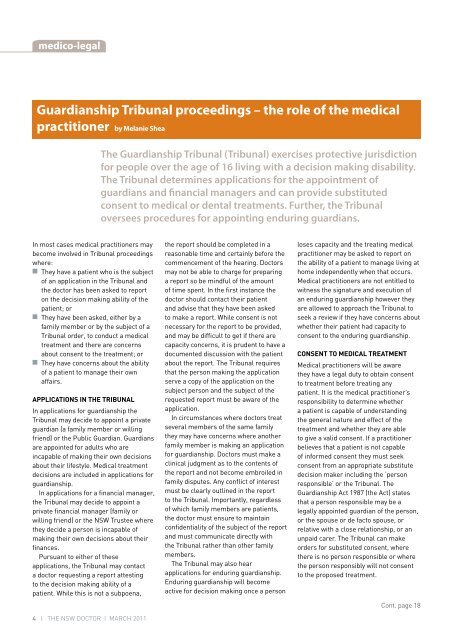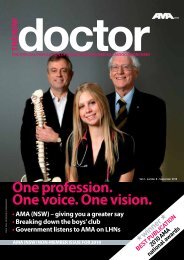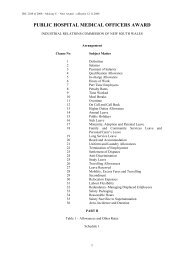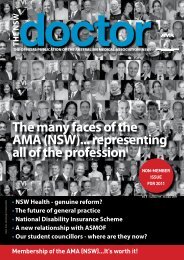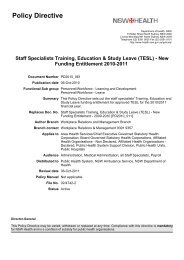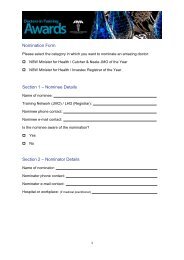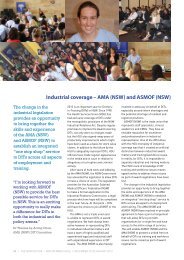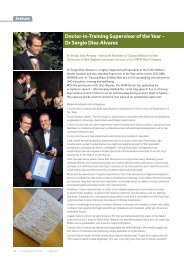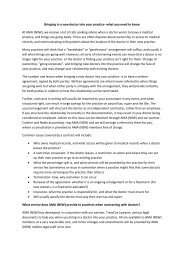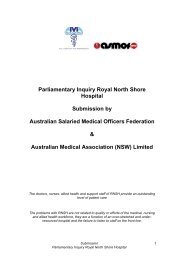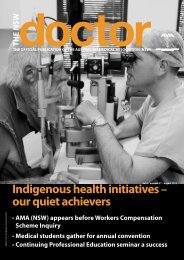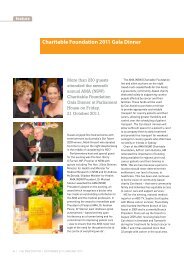The people behind the policies... - Australian Medical Association ...
The people behind the policies... - Australian Medical Association ...
The people behind the policies... - Australian Medical Association ...
Create successful ePaper yourself
Turn your PDF publications into a flip-book with our unique Google optimized e-Paper software.
medico-legalGuardianship Tribunal proceedings – <strong>the</strong> role of <strong>the</strong> medicalpractitioner by Melanie Shea<strong>The</strong> Guardianship Tribunal (Tribunal) exercises protective jurisdictionfor <strong>people</strong> over <strong>the</strong> age of 16 living with a decision making disability.<strong>The</strong> Tribunal determines applications for <strong>the</strong> appointment ofguardians and financial managers and can provide substitutedconsent to medical or dental treatments. Fur<strong>the</strong>r, <strong>the</strong> Tribunaloversees procedures for appointing enduring guardians.In most cases medical practitioners maybecome involved in Tribunal proceedingswhere:n <strong>The</strong>y have a patient who is <strong>the</strong> subjectof an application in <strong>the</strong> Tribunal and<strong>the</strong> doctor has been asked to reporton <strong>the</strong> decision making ability of <strong>the</strong>patient; orn <strong>The</strong>y have been asked, ei<strong>the</strong>r by afamily member or by <strong>the</strong> subject of aTribunal order, to conduct a medicaltreatment and <strong>the</strong>re are concernsabout consent to <strong>the</strong> treatment; orn <strong>The</strong>y have concerns about <strong>the</strong> abilityof a patient to manage <strong>the</strong>ir ownaffairs.Applications in <strong>the</strong> TribunalIn applications for guardianship <strong>the</strong>Tribunal may decide to appoint a privateguardian (a family member or willingfriend) or <strong>the</strong> Public Guardian. Guardiansare appointed for adults who areincapable of making <strong>the</strong>ir own decisionsabout <strong>the</strong>ir lifestyle. <strong>Medical</strong> treatmentdecisions are included in applications forguardianship.In applications for a financial manager,<strong>the</strong> Tribunal may decide to appoint aprivate financial manager (family orwilling friend) or <strong>the</strong> NSW Trustee where<strong>the</strong>y decide a person is incapable ofmaking <strong>the</strong>ir own decisions about <strong>the</strong>irfinances.Pursuant to ei<strong>the</strong>r of <strong>the</strong>seapplications, <strong>the</strong> Tribunal may contacta doctor requesting a report attestingto <strong>the</strong> decision making ability of apatient. While this is not a subpoena,4 I THE NSW DOCTOR I MARCH 2011<strong>the</strong> report should be completed in areasonable time and certainly before <strong>the</strong>commencement of <strong>the</strong> hearing. Doctorsmay not be able to charge for preparinga report so be mindful of <strong>the</strong> amountof time spent. In <strong>the</strong> first instance <strong>the</strong>doctor should contact <strong>the</strong>ir patientand advise that <strong>the</strong>y have been askedto make a report. While consent is notnecessary for <strong>the</strong> report to be provided,and may be difficult to get if <strong>the</strong>re arecapacity concerns, it is prudent to have adocumented discussion with <strong>the</strong> patientabout <strong>the</strong> report. <strong>The</strong> Tribunal requiresthat <strong>the</strong> person making <strong>the</strong> applicationserve a copy of <strong>the</strong> application on <strong>the</strong>subject person and <strong>the</strong> subject of <strong>the</strong>requested report must be aware of <strong>the</strong>application.In circumstances where doctors treatseveral members of <strong>the</strong> same family<strong>the</strong>y may have concerns where ano<strong>the</strong>rfamily member is making an applicationfor guardianship. Doctors must make aclinical judgment as to <strong>the</strong> contents of<strong>the</strong> report and not become embroiled infamily disputes. Any conflict of interestmust be clearly outlined in <strong>the</strong> reportto <strong>the</strong> Tribunal. Importantly, regardlessof which family members are patients,<strong>the</strong> doctor must ensure to maintainconfidentiality of <strong>the</strong> subject of <strong>the</strong> reportand must communicate directly with<strong>the</strong> Tribunal ra<strong>the</strong>r than o<strong>the</strong>r familymembers.<strong>The</strong> Tribunal may also hearapplications for enduring guardianship.Enduring guardianship will becomeactive for decision making once a personloses capacity and <strong>the</strong> treating medicalpractitioner may be asked to report on<strong>the</strong> ability of a patient to manage living athome independently when that occurs.<strong>Medical</strong> practitioners are not entitled towitness <strong>the</strong> signature and execution ofan enduring guardianship however <strong>the</strong>yare allowed to approach <strong>the</strong> Tribunal toseek a review if <strong>the</strong>y have concerns aboutwhe<strong>the</strong>r <strong>the</strong>ir patient had capacity toconsent to <strong>the</strong> enduring guardianship.Consent to medical treatment<strong>Medical</strong> practitioners will be aware<strong>the</strong>y have a legal duty to obtain consentto treatment before treating anypatient. It is <strong>the</strong> medical practitioner’sresponsibility to determine whe<strong>the</strong>ra patient is capable of understanding<strong>the</strong> general nature and effect of <strong>the</strong>treatment and whe<strong>the</strong>r <strong>the</strong>y are ableto give a valid consent. If a practitionerbelieves that a patient is not capableof informed consent <strong>the</strong>y must seekconsent from an appropriate substitutedecision maker including <strong>the</strong> ‘personresponsible’ or <strong>the</strong> Tribunal. <strong>The</strong>Guardianship Act 1987 (<strong>the</strong> Act) statesthat a person responsible may be alegally appointed guardian of <strong>the</strong> person,or <strong>the</strong> spouse or de facto spouse, orrelative with a close relationship, or anunpaid carer. <strong>The</strong> Tribunal can makeorders for substituted consent, where<strong>the</strong>re is no person responsible or where<strong>the</strong> person responsibly will not consentto <strong>the</strong> proposed treatment.Cont. page 18


